
- Learn English
- Universities
- Practice Tests
- Study Abroad
- Knowledge Centre
- Ask Experts
- Study Abroad Consultants
- Post Content
- General Topics
- Articles/Knowledge Sharing

Book Review- An Autobiography or The story of my experiments with Truth
In this review, I gave a brief account of the author of this book M.K. Gandhi and the reason behind him in writing this autobiography. I gave an explanation why Gandhi gave the tittle 'The story of my experiments with truth' rather than 'An autobiography' to his book which he used it only as a sub-tittle. I gave a brief summary of the various things present in different parts of this book for the benefit of the reader. I gave my personal opinion about this book as well as what makes this book worth reading.
About the Author The author of this book is the most popular legendary person of the twentieth century, Father of our Nation, Mahatma in the eyes of people, the person who sacrificed his whole life for the cause of independence to the country, the person who advocated principles of Truth, Satyagraha, Non-violence and spiritual thoughts of Self realization to the people, who is none other than Mohandas Karamchand Gandhi. Why Gandhi wrote his Autobiography? At around year 1920, some of his co-workers insisted him to write his autobiography. He was unable to carry out this work at that time because he was deeply involved in independence movement. Later on the insistence of one of his co-worker Swami Anand, Gandhi agreed to write his autobiography little by little in the form of small chapters to a magazine Navajivan to which Gandhi usually write his articles. But one of his close friend advised him that the principles what he advocate today in his autobiography, for any reason, if he changes in future there may not be any value for his words in people. This advise affected Gandhi very much and so he changed his mind regarding this autobiography. Finally Gandhi decided to write his personal experiences of the experiments what he has conducted on truth during his life time. The reason for this Gandhi made it clear in his introductory words of this book that he never want to boast himself as a hero in the minds of the people but he wants to transfer some good thoughts to the reader that he experienced during his life time. What is there in this book? 'The story of my experiments with truth' is in five parts which begins with Gandhi's birth and his experiences in his personal life till 1921. The original script was written in Gujarati language by M.K. Gandhi to Navajivan magazine and it was later translated into English by Mahadev Desai. According to Mahadev Desai the sub-tittle Autobiography was given by Gandhi himself for his 'The story of My experiments with Truth'. In this book, Gandhiji mainly emphasized his experiments on his principles of truth, non-violence, spiritualism, celibacy, self realization, vegetarianism etc. Gandhi requested the readers to conduct similar such experiments in their life in their own way in quest of truth. A brief summary of the five parts found in this autobiography was given below for the interest of the readers. Part one In this part Gandhiji introduced his family members and the details about his birth to the readers. He narrated about his childhood days in this part in an interesting way. He rated himself as an average student with a shy character to intermingle with others. At the same time Gandhi's rejection to copying incident at school, an anecdote one has to know through Gandhi's words only. Two things which literally helped in his character building at this age are a play let Shravana Pitribhakti Nataka (a story about Shravanas devotion to his elderly parents) and the other is Satyaharischandra (a character of purana who never speaks lie even at the cost of his life) play. His child marriage with Kasturba, death of his father, his journey to England to earn law degree, the problems he faced there with their culture as well as his strict adherence to vegetarianism, religious foundation he got through Gita and Bible are the interesting things that the reader can get a first hand information from this part. Part Two To deal with a case Gandhi went to South Africa and there he was humiliated by racial discrimination incident in a first class coach. Gandhiji was very much moved by the oppressive and racial discrimination methods shown by South African rulers over the Indians who are living there. This heart throbbing situation of local Indians in South Africa made him a confident and strong leader. Part three Along with his family Gandhi went to South Africa to work with local Indians. He decided to completely dedicate his life to human service. He used to attend hospitals daily for two hours to clean the wounds of the patients and even clean toilets. At this time he developed the concepts of Brahmacharya, Non-violence and Satyagraha which later helped in the battle against British rulers in India. Finally the mission lead by Gandhi in South Africa has tasted success and that is the first win for Gandhi as a leader. Part Four Gandhi's increased interest in practicing vegetarianism, experiments of truth in court cases, experiments with satyagraha, experimenting Naturopathy in treating diseases, fasting method to self restraining, training of the spirit, meeting with Gokhalae are the interesting things found in this part. Part Five People treated Gandhiji as hero after his successful mission at South Africa. On the request of his political guru Gokhale, Gandhiji traveled throughout India and that made him realize the poor condition of Indians at the hasty rule of British. Champran satyagraha, Ahamedabad satyagraha, Kheda satyagraha, Satyagraha against Rowalat's act are important events we can know from this part. What makes this book worth reading? 1. A legendary and most popular person like Gandhi in his own words giving about the experiences of his personal life and an account of various events which occurred during independence struggle at that time will create a lot of interest among the people to read this book. Those who want to know history of Indian independence struggle, by reading this book they get a first hand information from a person who actually lead the struggle from front. 2. In writing this book Gandhi hide nothing the information that can reach the people whether it is good or bad.He was harsh on himself in admitting his mistakes as well as the ways he used to correct his mistakes. This sincerity or honesty of this great person had an influence on increasing the value of this book. 3. An average ordinary person who is shy even to mingle with others how he became 'Mahatma (great soul)' in the eyes of the people? How this simple person with his magnificent power of attraction able to bring millions of people together to fight against British?To know the answers for these questions one has to read the autobiography of M.K. Gandhi. 4. The simple and lucid style of his writing will help the readers to understand things easily. The various events and incidents which he experienced during his life time he put forth in this book in a very interesting way. These experiences enrich the reader with the values and principals followed by Gandhiji during his life time. Gandhiji used to practice anything before he actually preach to any body. This principle that Gandhiji followed throughout his life brought millions of admirers to him to unite and fight against British. 5. Readers can experience the values of spiritualism, truthfulness, non-violence, self realization etc. from the illustrations he made in this book. From Tolstoy form experience in South Africa, Gandhiji realized that the young can be trained only through spiritual training. Spiritual training helps to mold the character of an individual. Without character building there is no value for education in young. Similarly in Gandhiji's opinion Truth is God. Through truth only self realization occur in a person. The experiments on truth that Gandhiji carried through out his life for the purpose of this self realization only. During independence struggle Gandhiji preached non-violence to people which became a weapon in achieving independence to India. My opinion about this book 'An autobiography or The story of my experiments with truth' written by M.K. Gandhi is highly inspiring book and in my opinion it ought to be read by every Indian. After reading this book, definitely every reader will appraise Gandhi's honesty and sincerity in presenting every minute details of his personal life without hiding anything to the reader, even though such incidents presented by him may derogate his value. I really appreciated this nature of Gandhi in my mind after reading this book. Gandhi put to practice the things before he actually preach them to others. I really appreciate this attitude of Gandhi and sincerely believe that this is the reason why millions of people through out the World whether supporters or opponents admired him and like to have a glimpse of him at least once in their life time. One more thing I realized about Gandhiji after reading this book and I really appreciate is the modest way he lead his life. The autobiography that Gandhi wrote is simply superb, especially he narrated all the events which occurred in his life very interestingly as well as the language used for this narration is very simple even to the understanding level of a common man. Conclusion Without doubt this is one of the most popular and famous book of this century. Gandhi gave utmost importance to principals, values and humanity rather than his life itself. Gandhiji lived his whole life as an example to others rather than simply preaching values to others. The great scientist, Albert Einsteen rightly remarked, the generation to come may not believe such a person like Gandhi with blood and flesh has walked on this earth. People have realized the importance of the principals and values of Gandhiji at present than before. Big people like Martin Luther King Jr., Nelson Mandela and American President Oboma became ardent admirers of Gandhi. Without any doubt the centuries to come Gandhiji will be remembered by people of any generation for the non-violent way he got independence to India.
Amazing work. Thank you for the ton of information which also helped me in a project.
- Do not include your name, "with regards" etc in the comment. Write detailed comment, relevant to the topic.
- No HTML formatting and links to other web sites are allowed.
- This is a strictly moderated site. Absolutely no spam allowed.
Top Contributors
About IndiaStudyChannel.com
Being the most popular educational website in India, we believe in providing quality content to our readers. If you have any questions or concerns regarding any content published here, feel free to contact us using the Contact link below.
- Admissions Consulting
- Adsense Revenue
- Become an Editor
- Membership Levels
- Winners & Awards
- Guest Posting
- Help Topics
STUDY ABROAD
- Study in Foreign Universities
- Study in Germany
- Study in Italy
- Study in Ireland
- Study in France
- Study in Australia
- Study in New Zealand
- Indian Universities
- Nursing in Mangalapuram
- BDS in Mangalore
- MBA in Bangalore
- Nursing admissions in Mangalore
- Distance MBA
- B Pharm in Mangalore
- MBBS in Mangalore
- BBA in Mangalore
- MBA Digital Marketing
- Privacy Policy
- Terms of Use
Promoted by: SpiderWorks Technologies, Kochi - India. ©
- Book Review: A Good Girl’s Guide to Murder by Holly Jackson
- Book Review: Where Has My Ceiling Gone? by Warren Veenman & Sally Eichhorst
- List of Books with a Number in the Title | Top books with numbers in the title
- The Valley of Fear | Arthur Conan Doyle | Book Review | Sherlock Holmes’ Last Mystery Novel
- The Honor Bound Groom | Jennifer Greene | Book Review | Mills & Boon Romance

My Experiments with Truth | Book Review | Mahatma Gandhi Autobiography
Mahatma Gandhi or Mohandas Karamchand Gandhi, one of the most iconic leaders in history especially Indian history, left behind a legacy of wisdom, compassion, and non-violence. His autobiography My Experiments with Truth chronicles his early life as well as his journey to becoming a leader who lead billions of Indians to take down the British rule in India. This book is one of those reads that will change your life for the better. So, read the book summary, favourite book quotes, and book review of My Experiments with Truth by Mahatma Gandhi in this post below.
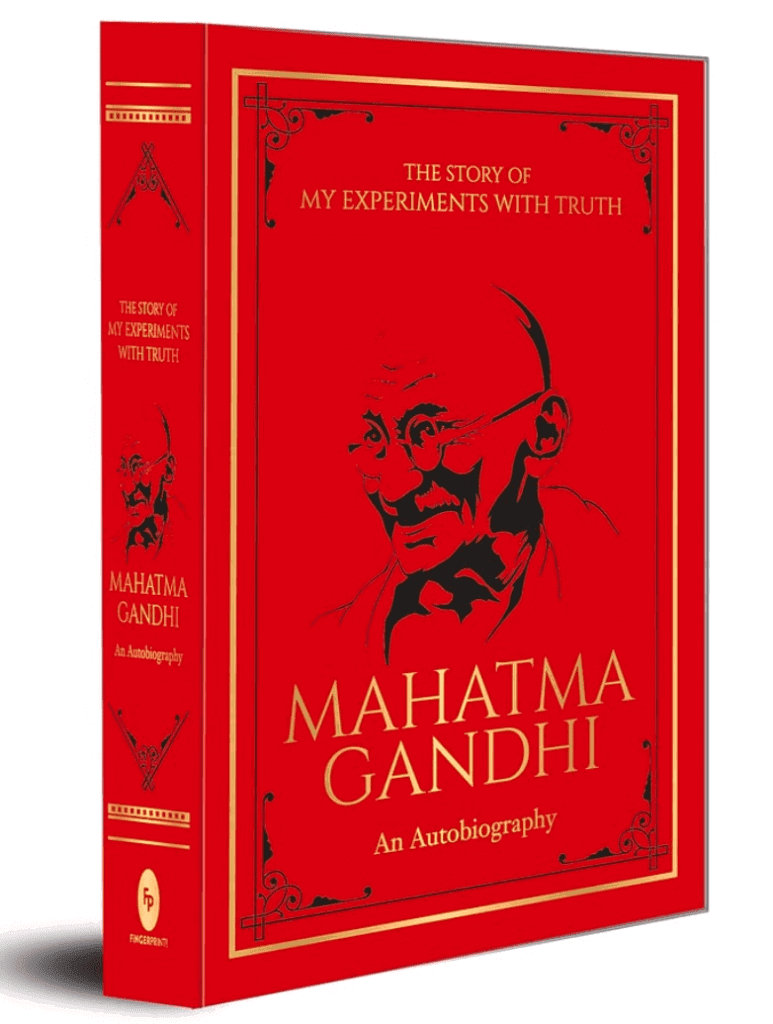
About My Experiments with Truth by Mahatma Gandhi:
No. of Pages: 448
Book Release Date: 1925 in Gujarati
Genre: Autobiography, Non-Fiction, Memoir, Biography, History, Indian history
Reading Age: 15 years and above
Buy From: AMAZON
The Story of My Experiments with Truth by M.K. Gandhi Book Summary:
My Experiments with Truth is the autobiography of Mahatma Gandhi, where he reflects on his life journey, values, and the principles that shaped his actions. Originally published as weekly instalments in his Gujarati newsletter, this book covers his early childhood in India, his education in England, and his legal practice in South Africa, where he first encountered racial discrimination. It was here that Gandhi began his experiments with non-violent resistance, or Satyagraha , which later became central to India’s struggle for independence .
Gandhi candidly shares personal challenges, including his spiritual growth, struggles with self-discipline, and his unwavering commitment to truth ( Satya ) and non-violence ( Ahimsa ). He discusses his experiments with vegetarianism, simplicity, and celibacy, all of which were part of his pursuit of self-purification. Through his reflections, readers gain insights into his philosophy of life, leadership, and his profound dedication to service and justice.
So, this book offers not only a glimpse into Gandhi’s personal life but also serves as a guide for those seeking to live with integrity, compassion, and a sense of moral duty.
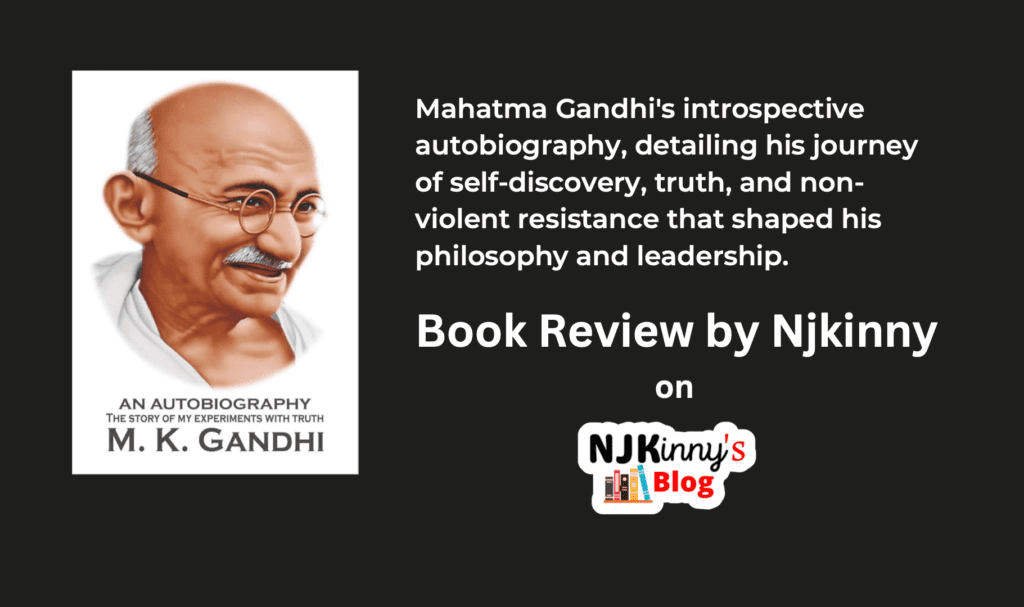
My Experiments with Truth : Autobiography of Mahatma Gandhi Book Review:
Mahatma Gandhi’s My Experiments with Truth is more than just an autobiography—it’s a deep dive into the life and philosophy of one of the most influential figures in history. Reading this book feels like sitting down with Gandhi himself as he opens up about his life, beliefs, and the personal trials that shaped his unique outlook on truth, non-violence, and simplicity. Also his autobiography covers the period from his birth (1869) to the year 1921.
After that 1921, this quote he shares in the last chapter says it all why he didn’t write about his life further.
My life from this point onward has been so public that there is hardly anything about it that people do not know…”
Why Autobiography of Mahatma Gandhi is a Must-Read:
A first-hand account of gandhi’s life:.
The book provides an intimate look at Gandhi’s childhood in India, his journey to England for education, and his experiences in South Africa, where he developed his concept of Satyagraha (non-violent resistance). These insights allow readers to understand the real person behind the legend.
A Guide to Living a Purposeful Life:
M.K. Gandhi’s relentless pursuit of truth ( Satya ) and non-violence ( Ahimsa ) is at the heart of this book. His “experiments” with diet, celibacy, and simplicity are meant to inspire readers to focus on self-discipline and personal growth.
The seeker after truth should be humbler than the dust. The world crushes the dust under its feet, but the seeker after truth should so humble himself that even the dust could crush him. Only then, and not till then, will he have a glimpse of truth.”
Timeless Values for Today’s World:
The core values Mahatma Gandhi stood for—truth, justice, equality, and non-violence—remain incredibly relevant today. His approach to resolving conflict peacefully offers powerful lessons for anyone navigating personal or societal challenges in the modern world.
A powerful Quote that shows Mahatma Gandhi’s determination in his quest for justice.
Remember that all through history, there have been tyrants and murderers, and for a time, they seem invincible. But in the end, they always fall. Always.”
The Book’s Global Influence:
My Experiments with Truth is famous because it doesn’t just tell Mohandas Karamchand Gandhi’s story; it shares his philosophy that influenced movements for civil rights and freedom across the globe. Leaders like Martin Luther King Jr. and Nelson Mandela drew inspiration from Mahatma Gandhi’s approach.
Who Should Read My Experiments with Truth by Mahatma Gandhi:
- Anyone Interested in History or Social Change:
Gandhiji’s life and actions had a profound impact on world history, especially India’s independence from British rule. If you’re interested in understanding the roots of non-violent resistance or the Indian independence movement, this book is essential.
- People Seeking Personal Growth:
Gandhiji’s focus on self-discipline and living with integrity offers valuable lessons for those wanting to lead a more meaningful and purposeful life.
Men often become what they believe themselves to be.If I believe I cannot do something,it makes me incapable of doing it. But when I believe I can , then I acquire the ability to do it even If I didn’t have it in the beginning.”
- Aspiring Leaders:
For anyone in leadership roles, the book is full of lessons on how to lead with humility, integrity, and a commitment to justice.
Mahatma Gandhi very clearly defines duty.
Our duty is very simple and plain. We want to serve the community, and in our own humble way to serve the Empire. We believe in the righteousness of the cause, which it is our privilege to espouse. We have an abiding faith in the mercy of the Almighty God, and we have firm faith in the British Constitution. That being so, we should fail in our duty if we wrote anything with a view to hurt.”
Click to grab this gorgeous edition of My Experiments with Truth by Mahatma Gandhi:

Conclusion:
In words of mahatma gandhi, he describes his autobiography “my experiments with truth” the best..
It is not my purpose to attempt a real autobiography. I simply want to tell the story of my numerous experiments with truth, and as my life consists of nothing but those experiments, it is true that the story will take the shape of an autobiography.”
All in all, what makes My Experiments with Truth so compelling is Gandhiji’s honesty. He doesn’t present himself as perfect but openly shares his mistakes, doubts, and the constant learning that shaped him into the leader he became. The conversational tone and candid nature of the book make it easy to relate to, while the lessons it offers are timeless. It’s a powerful read for anyone who’s looking to understand the power of truth, self-improvement, and living with purpose.
So, a must read book, Njkinny recommends this autobiography that will change your life. A perfect gifting option, this one is not-to-be-missed.
- Also read 5 Life Changing Key Lessons from “My Experiments with Truth” by Mahatma Gandhi
Share about this post on X!
You will also like reading:.
- The Last Lecture by Randy Pausch (Ispirational Memoir) Book Review and Book Quotes
- Ramayana Wisdom: 10 Key Life Lessons in Quotes
- Best Anne Frank Quotes that Inspire, give Hope, and instil Strength
- Letters from Kargil: The Kargil War through our soldiers’ eyes by Diksha Dwivedi Book Review and Book Quotes
This post contains affiliate links. Any purchases you make using these links earn me a small commission without costing you anything. So, reward my efforts and help me in the upkeep costs of this blog. Read more here . Please shop using these links. Thanks!
Share this post on Facebook, Twitter, Instagram, Pinterest. Use hashtags #BookReviewByNjkinny , #NjkinnyRecommends and #NjkinnysBlog
Join the Family. Subscribe to our newsletter
No Spam. Just Love and great Books. And it’s FREE!
- Parenting Strategies Unplugged | Shibu Nair | Book Review | Your Guide to Positive Parenting
- 5 Life Changing key lessons from My Experiments with Truth by Mahatma Gandhi
You May Also Like
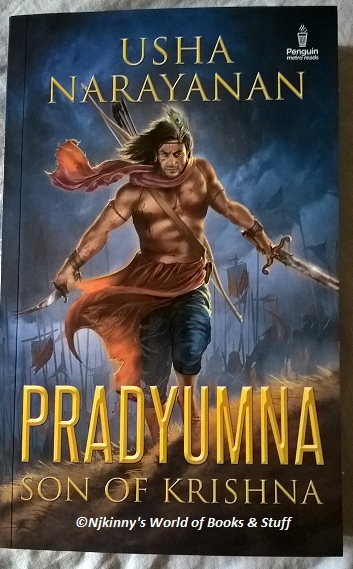
Pradyumna: Son of Krishna | Usha Narayanan | Book Review
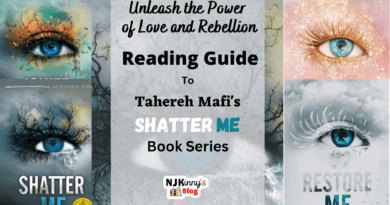
Unlocking the World of “Shatter Me” Book Series : Reading Order Guide

Verity | Colleen Hoover | Book Review |Eerie Romantic Thriller
Leave a reply cancel reply.
Your email address will not be published. Required fields are marked *
Save my name, email, and website in this browser for the next time I comment.

Good Books Are Just Like Good Friends
My Experiments With Truth Book Review [Best Review]
In this post “The Story Of My Experiments With Truth Book Review”, we review this whole book in-depth, So you will know whether you should read this book or not.
Page Contents

The Story Of My Experiments With Truth Book Review
Book details.

Book Ratings
The Story Of My Experiments With Truth has Book Review ratings on other popular websites.
You Can Also Read This:
10+ Famous Books Written By Mahatma Gandhi Ji
About The Book
“The Story of My Experiments with Truth” is the autobiography book of Mohandas Karamchand Gandhi, which runs from his childhood to the year 1921. In the year 1998, by a committee of religious authorities, this book was nominated as one of the “ Best 100 Spiritual Books of the 20th Century “.
In this book, Gandhi Ji describes his all life events like birth and parentage, childhood, experiences at school, child marriage, relationship with his wife and parents, his study tour to London, and many more. Gandhiji wrote this book in his mother tongue Gujarati, later it was translated by Mahadev Desai, best remembered as a personal secretary of Gandhi Ji. The book ends after a discussion of the Nagpur session of the Congress party in 1915.
Now, Let’s discuss The Story Of My Experiments With Truth Summary.
The Story Of My Experiments With Truth Summar y
The Story of My Experiments With Truth Summary, In the below section we give a brief summary of this book.
Introduction
This book of Gandhi Ji starts with an Introduction, the introduction is written by Gandhi Ji himself, mentioning how he has written his autobiography. The goal of his story is simply to narrate his experiments with truth in life. Gandhi Ji also says through this book he wishes to narrate his moral experiment and spiritual experience rather than political ones .
The first part describes the incidents of Gandhi Ji’s childhood, his experiments with smoking, eating meat, drinking, stealing, and after satisfaction.
The second part of the book tells about Gandhi’s experiences in the Cape Colony during a period of stress between the different ethnic groups in the region. When Gandhi Ji succeeded in growing his own practice to about twenty Indian merchants who contracted him to manage their affairs, It was then that he ended up working in South Africa after almost twenty years.
After success in work, he allowed him to earn a living while also finding time to devote to his mission as a public figure. During Gandhi Ji’s struggle against inequality and racial discrimination in South Africa, He became known among Indians all around the world as “Mahatma,” or “Great Soul.”
In 1896, Gandhi Ji returned to India to be with his wife and children, Gandhiji continued his work on the Natal Indian Congress, and his loyalty to the British Empire guided him to help them during the Second Boer War. In the year 1914 in July, He sailed for Britain, now admired as “Mahatma,” and popularly known throughout the world for the success of satyagraha.
When World War I started, Gandhi Ji was in England, he immediately began organizing a medical team similar to the unit he had led in the Boer War, but he also faced some health problems that caused him to return to India.
The British colonial authorities put Gandhi on trial for sedition and punished him with six years in prison, this was the first time that he faced prosecution in India. The government allowed him to use a spinning wheel and reading materials while in prison, so he felt content and, he also wrote most of his autobiography in prison.
Conclusion of My Experiments With Truth Book Review
Gandhi Ji wrote a suitable conclusion to the readers, in his “Farewell” for an autobiography that he never intended to be an autobiography, but a tale of experiments with truth, and life.
Books Different Editions

This publication is also the best seller on Amazon.
If you want to check out the offers of this book all the editions of this book links are given below.
Why to read My Experiment With Truth
- The author of this book was Mahatma Gandhi, later it was translated by Mahadev Desai.
- This book was nominated as one of the “ Best 100 Spiritual Books of the 20th Century “.
- This book is based on the life of Mohandas Karamchand Gandhi, He is also known among Indians all around the world as “Mahatma” or “Great Soul.”
- This is an inspirational book and autobiography of Mahatma Gandhi, which inspires you a lot to do something big.
- The book’s content is about moral teachings, His morality is deeply rooted in Indian culture and Hindu religion.
You Can Also Read This: Recent Post
10+ Must-Read Books of Swami Vivekananda
20 Sudha Murthy Books You Will Really Love To Read
15 Ruskin Bond Books Famous Books
Thank You For Visiting Our Site
We hope you like our post on “The Story Of My Experiments With Truth Book Review”, Share your thoughts below in the comment section.
Share this:
- Click to share on WhatsApp (Opens in new window)
- Click to share on Telegram (Opens in new window)
- Click to share on Pinterest (Opens in new window)
- Click to share on Facebook (Opens in new window)
- Click to share on Twitter (Opens in new window)
Related post
Leave a comment cancel reply.
Your email address will not be published. Required fields are marked *
Save my name, email, and website in this browser for the next time I comment.

Join Our Telegram Group To Stay Updated With Our Latest posts, Free Books, Ebooks, PDFs, and much more in one place...
No thanks, I’m not interested!
Review: Mohandas K. Gandhi Autobiography

Review Copyright © 1998 Garret Wilson — April 3, 1998, 11:00pm
Mohandas K. Gandhi subtitled his autobiography, "The Story of My Experiments with Truth," according to translator Mahadev Desai. In it, Gandhi relates, as best he can remember, events from his childhood to later struggles in India. Written in large part while jailed, Gandhi seems to set forth his experiences as objectively as he knows how, and in the process reveals a portrait of a man wise yet foolhardy, steadfast yet wavering. A portrait of a man striving to further humanity.
This autobiography was written in Gujarati, and translated into English by Mahadev Desai. It is an "unabridged republication of the edition published by Public Affairs Press" in Washington, D.C. There are two editions of the book, both with the exact same text by the same translator. The other edition, proclaiming to be the only official autobiography of Gandhi, is slightly more expensive.
Gandhi’s autobiography is about memories of "experiments," or Gandhi’s experiences of trying to better himself and others. It gives some historical information, but assumes in many places that the reader is familiar with the facts of the situation being described. Gandhi therefore refers the reader to his other works on Satyagraha in South Africa, for example. He also explicitly states, in one circumstance, that everyone knows so much about the facts that he is not going to repeat them.
Gandhi does not seem to be writing for the generations later that will be interested in him, but rather for the admirers of Mahatma who wish to know more about their hero. It would therefore be useful to use either a biography of Gandhi or a history book or both as supplements — I for one am still left unclear on how Gandhi’s work effected India as a whole, for example. This autobiography is more of an inward explanation, a picture of Gandhi as Gandhi seems himself, an appeal to others to learn from his mistakes and to partake in his discoveries.
Late 19 th century India certainly does not have a reputation for protecting the rights of women, children, and lower castes. Tolerance of differences was not popular. Gandhi in many areas is clearly seen to be progressive, even revolutionary. He relates his arranged child marriage with honesty, and rebukes the practice. Throughout his life, he fought against the treatment of "untouchables." With Gandhi, tolerance to other religions and belief systems was the rule. At many places, one wants to cheer him on as he seems to press for equality for all.
But that is not the entire picture of Gandhi the man. Just as Washington owned slaves, just as other great leaders had problems, Gandhi is in some ways a product of his times, and some beliefs and attitudes, however painfully blemishing, are certainly inevitable. However Gandhi tried to raise himself to a holy level of truth, hindsight reveals his shortcomings.
Gandhi’s arranged marriage as a child certainly put Gandhi in a ripe situation for making mistakes, something Gandhi readily admits in his account. But some things which to me seem quite incorrect are recounted as if they were usual, as if they were the correct position to take. Although renouncing arranged child marriages, the fact that Gandhi treated his wife as less than his equal is never questioned. Gandhi constantly refers, for example, of various time when he attempted, or at least intended, to teach his illiterate, uneducated wife, Kasturbai. Somehow, he never got around to it.
We can also perhaps forgive Gandhi for the scientific limitations of the day. While in some places denouncing superstition, he nevertheless had no scientific data to instruct him on, for example, the benefits or detractions of milk, meat, and vegetables. Gandhi at a very early point claimed that his vegetarianism was not only because of religious beliefs but also because of health reasons. While his abstinence from milk and other foods ranged from religious beliefs, vows, the treatment of cows, "scientific" books, and various other reasons, the scientific aspect left much to be desired. His belief in earth treatments abounded, and one cringes at the thought of him binding up a wound in a bandage filled with dirt.
What pained me so much in the book was not Gandhi’s limited scientific knowledge — he readily admitted that many remedies and ideas had no proof and were simply his beliefs on faith — but his attitude toward others. Gandhi searched for truth, and when he at times determined that he had found it, or part of it, the rest of the world was treated as though it were an extension of Gandhi. If Gandhi thought that he should grind his own meal, the boys at the school at which he was teaching would grind their own meal, too.
Once, his admirers in South Africa gave him a large amount of gifts as a going-away present. He decided they were simply unneeded, so he put them in a fund for the help of the community. That’s fine, but some of those gifts were meant for his wife, who had never had much jewelry. In her words, as Gandhi remembers them:
You may not need them... Your children may not need them. Cajoled they will dance to your tune. I can understand your not permitting me to wear them. But what about my daughters-in-law? They will be sure to need them. And who knows what will happen tomorrow? I would be the last person to part with gifts so lovingly given... You deprived me of my ornaments, you would not leave me in peace with them. Fancy you offering to get ornaments for the daughters-in-law... No, the ornaments will not be returned. And pray what right have you to my necklaces? (193-194)
Needless to say, the ornaments were returned, because Gandhi was "definitely of the opinion that a public worker should accept no costly gifts" (194). As might be expected by reading this far, Gandhi "never since regretted the step," and his wife "also [saw] its wisdom" (194). It seems that, ultimately, Gandhi always got his way with Kastrubai, even when he got to the point where he felt it necessary to purge himself from lust, ultimately refusing to even sleep in the same room with her for fear it would tempt him sexually.
At one point Kasturbai was seriously ill. Her doctor recommended beef tea and asked permission from Gandhi, but on Gandhi’s arrival he found the doctor had already given her some. Gandhi was "deeply pained," and the doctor explained that "so long as you keep your wife under my treatment, I must have the option to give her anything I wish. If you don’t like this, I must regretfully ask to you remove her. I can’t see her die under my roof" (289).
Gandhi thought it was his "painful duty" to consult his wife. Even though she had for some reason complied with the doctor’s recommendation before Gandhi arrived, her story now was suddenly, "I will not take beef tea... I would far rather die in your arms than pollute my body with such abominations" (289). With six men carrying her in a hammock through the rain, Gandhi removed his nearly-dead wife from the doctor’s house so that she would not partake in something that was against his beliefs.
After getting well for a short while, she again started getting worse. Gandhi at the time had been deliberating giving up salt and a few other things that did nothing but give "mere satisfaction to the palate." He therefore "entreated her to give up salt and pulses. She would not agree, however much [Gandhi] pleaded with her," and she noted that he had not in fact given up these articles. He therefore "got an opportunity to shower [his] love on her," and declared that he would give up salts and pulses for a year, whether she did or not. She was shocked, asked for forgiveness, and asked him to take back his vow, but he would not. "‘You are too obstinate. You will listen to none,’ she said, and sought relief in tears" (291-292). A poor way, in my opinion, to shower someone in love.
These sections indicate that at times Gandhi’s obsession for his "truth" seemed to cloud his mind to the conditions and feelings of others. While feeling humble and unworthy of praise, Gandhi nevertheless seemed to have some innate egotistical tendencies that constantly made questioning his opinion unthinkable, almost hideous to him. During his "experiments with the truth," many times those around him seem to become his guinea pigs. Gandhi "did not hesitate," for example, to sacrifice his sons’ academic education for "service to the community" (276).
To further illustrate the atmosphere of "tread softly around Gandhi," as it were, which seemed to follow him, consider that, "We were all vegetarians on Tolstoy Farm, thanks, I must gratefully confess, to the readiness of all to respect my feelings. The Musalman youngsters must have missed their meat during ramzan , but none of them ever let me know that they did so" (296). Indeed, this seems to be quite a typical attitude: quietly obey the great Gandhi’s wishes and don’t let him know that you have a problem with it — it’s better that way for everyone involved.
Gandhi wrote an autobiography in his own words, so honest and objective that one can see his good points and bad points, his successes and failures, his triumphs and mistakes. Reading this book has its highs and lows, because at times you feel proud of the central character, and at times you feel ashamed. Gandhi does a good job of showing us, not so much what happened (although I assume the work is more or less historically accurate), but what and why Gandhi thought and did everything. This frankness allows us to see the good and bad, the internals of a very wise and successful man, but ultimately we see a Gandhi who was limited by the same thing that limits us all: our humanity.
April 4, 1998, 7:24 pm I realized today that, even in America, women did so much as gain the right to vote until the passing of the Nineteenth Amendment on August 26, 1920. Taking into consideration the conditions the position of women in India and the world in general in the early 20th century, Gandhi’s attitudes towards his wife as presented in his autobiography should be reconsidered. While certain of his actions leave me with a bad taste in my mouth, as it were, as I sit in the last years of the 20th century, I’m sure that an examination of other sources, both on the life of Gandhi and the common treatment of Indian women at the time could very well put Gandhi’s actions in this regard in a different light.
Copyright © 1998 Garret Wilson
The IndiaBookStore blog
Review: My Experiments With Truth by M.K. Gandhi
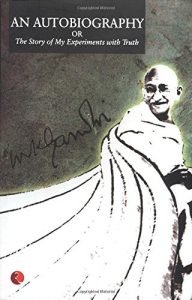
Farrukh Kidwai
Latest posts by farrukh kidwai ( see all ).
- Review: Sapiens: A Brief History of Humankind - February 16, 2015
- Review: The Story of Jews-Finding the Words by Simon Schama - August 27, 2014
- Ache Din Aa Rahe Hain! Unreal Elections? - July 16, 2014
10 Comments
Review: The Argumentative Indian by Amartya Sen - Bookish
Review: Gandhi Before India by Ramachandra Guha
This book is amazing….but too long to read and prepare for projects!!!!!!!!!!
Try the abridged version: http://www.indiabookstore.net/search?q=9780143415947
Review: Long Walk to Freedom by Nelson Mandela - Bookish
Leave a Reply Cancel reply
Your email address will not be published. Required fields are marked *
Save my name, email, and website in this browser for the next time I comment.

Recently Visited
Top Categories
Children's Books
Discover Diverse Voices
More Categories
All Categories
New & Trending
Deals & Rewards
Best Sellers
From Our Editors
Memberships
Communities
- Biographies & Memoirs

Download the free Kindle app and start reading Kindle books instantly on your smartphone, tablet, or computer - no Kindle device required .
Read instantly on your browser with Kindle for Web.
Using your mobile phone camera - scan the code below and download the Kindle app.

Image Unavailable

- To view this video download Flash Player
An Autobiography or The Story of My Experiments with Truth: A Critical Edition Hardcover – March 20, 2018
- Print length 816 pages
- Language English
- Publisher Yale University Press
- Publication date March 20, 2018
- Dimensions 7 x 1.94 x 10 inches
- ISBN-10 0300234074
- ISBN-13 978-0300234077
- See all details

Similar items that may deliver to you quickly
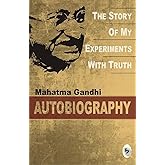
Editorial Reviews
About the author, product details.
- Publisher : Yale University Press; Critical edition (March 20, 2018)
- Language : English
- Hardcover : 816 pages
- ISBN-10 : 0300234074
- ISBN-13 : 978-0300234077
- Item Weight : 3.5 pounds
- Dimensions : 7 x 1.94 x 10 inches
- #1,119 in India History
- #6,924 in Religious Leader Biographies
- #40,027 in Memoirs (Books)
Customer reviews
- 5 star 4 star 3 star 2 star 1 star 5 star 86% 14% 0% 0% 0% 86%
- 5 star 4 star 3 star 2 star 1 star 4 star 86% 14% 0% 0% 0% 14%
- 5 star 4 star 3 star 2 star 1 star 3 star 86% 14% 0% 0% 0% 0%
- 5 star 4 star 3 star 2 star 1 star 2 star 86% 14% 0% 0% 0% 0%
- 5 star 4 star 3 star 2 star 1 star 1 star 86% 14% 0% 0% 0% 0%
Customer Reviews, including Product Star Ratings help customers to learn more about the product and decide whether it is the right product for them.
To calculate the overall star rating and percentage breakdown by star, we don’t use a simple average. Instead, our system considers things like how recent a review is and if the reviewer bought the item on Amazon. It also analyzed reviews to verify trustworthiness.
- Sort by reviews type Top reviews Most recent Top reviews
Top reviews from the United States
There was a problem filtering reviews right now. please try again later..
Top reviews from other countries
- Amazon Newsletter
- About Amazon
- Accessibility
- Sustainability
- Press Center
- Investor Relations
- Amazon Devices
- Amazon Science
- Sell on Amazon
- Sell apps on Amazon
- Supply to Amazon
- Protect & Build Your Brand
- Become an Affiliate
- Become a Delivery Driver
- Start a Package Delivery Business
- Advertise Your Products
- Self-Publish with Us
- Become an Amazon Hub Partner
- › See More Ways to Make Money
- Amazon Visa
- Amazon Store Card
- Amazon Secured Card
- Amazon Business Card
- Shop with Points
- Credit Card Marketplace
- Reload Your Balance
- Amazon Currency Converter
- Your Account
- Your Orders
- Shipping Rates & Policies
- Amazon Prime
- Returns & Replacements
- Manage Your Content and Devices
- Recalls and Product Safety Alerts
- Registry & Gift List
- Conditions of Use
- Privacy Notice
- Consumer Health Data Privacy Disclosure
- Your Ads Privacy Choices

Some men changed their times... One man changed the World for all times!
Comprehensive website on the life and works of, mahatma gandhi.
+91-23872061 +91-9022483828 [email protected]
- Gandhi Autobiography or The Story of My Experiments with Truth
An Autobiography or The Story of My Experiments with Truth
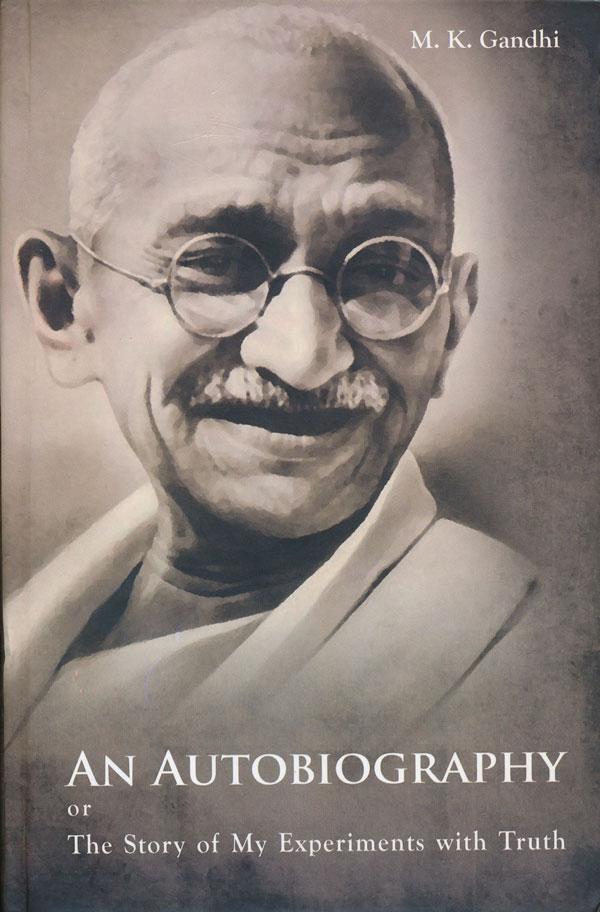
Mahatma Gandhi's Autobiography is one book which guides you as to what is right and wrong. Most importantly, the author should have experienced all these. The original was in Gujarati, and was later translated into English and other Indian languages. The book is in five parts, beginning with his birth, up until the year 1921. In the last chapter he writes, "My life from this point onward has been so public that there is hardly anything about it that people do not know..."
The introduction reads, "What I want to achieve - what I have been striving and pining to achieve these thirty years - is self-realization, to see God face to face, to attain Moksha. I live and move and have my being in pursuit of this goal."
The paperback edition of the book costs Rs. 80/- being subsidized by the Navajivan Trust, Ahmedabad.

IMAGES
VIDEO
COMMENTS
AN AUTOBIOGRAPHY OR THE STORY OF MY EXPERIMENTS WITH TRUTH. : M. K. Gandhi. An immortal book and a legacy for ages to come. This book is an autobiography of Gandhi. It is a detailed account of Gandhi s consisting of Gandhi s self penned essays (105 essays in all) on his experiments and covers all aspects of the Mahatma s spiritual life.
1. A legendary and most popular person like Gandhi in his own words giving about the experiences of his personal life and an account of various events which occurred during independence struggle at that time will create a lot of interest among the people to read this book. Those who want to know history of Indian independence struggle, by ...
M.K. Gandhi’s relentless pursuit of truth (Satya) and non-violence (Ahimsa) is at the heart of this book. His “experiments” with diet, celibacy, and simplicity are meant to inspire readers to focus on self-discipline and personal growth. The seeker after truth should be humbler than the dust. The world crushes the dust under its feet, but ...
This book was nominated as one of the “ Best 100 Spiritual Books of the 20th Century “. This book is based on the life of Mohandas Karamchand Gandhi, He is also known among Indians all around the world as “Mahatma” or “Great Soul.”. This is an inspirational book and autobiography of Mahatma Gandhi, which inspires you a lot to do ...
The Story of My Experiments with Truth (, lit. 'Experiments of Truth or Autobiography') is the autobiography of Mahatma Gandhi, covering his life from early childhood through to 1921. It was written in weekly installments and published in his journal Navjivan from 1925 to 1929. Its English translation also appeared in installments in his other ...
There are two editions of the book, both with the exact same text by the same translator. The other edition, proclaiming to be the only official autobiography of Gandhi, is slightly more expensive. Gandhi’s autobiography is about memories of "experiments," or Gandhi’s experiences of trying to better himself and others.
Review: My Experiments With Truth by M.K. Gandhi. Gandhiji's autobiography is a must-read for every Indian. Every citizen must form their own unbiased opinion of the Father of the Nation, and reading his own words will help one do that. This is one of those rare books which the reader either loves or hates; there is no middle ground.
Book Review: Gandhi's Autobiography: The Story of My Experiments with Truth. A. C. Cooke View all authors and affiliations. Based on: GANDHI'S AUTOBIOGRAPHY: THE ...
Gandhi’s autobiography audaciously seeks to tell the story of truth’s experiments with the self it both sustains and destroys.”—Faisal Devji, Los Angeles Review of Books Winner of the Outstanding Academic Title for 2018 award sponsored by Choice “Gandhi’s autobiography is probably the most important book ever published in India ...
An immortal book and a legacy for ages to come. This book is an autobiography of Gandhi. It is a detailed account of Gandhi’s consisting of Gandhi’s self penned essays (105 essays in all) on his experiments and covers all aspects of the Mahatma’s spiritual life. This Autobiography is divided in five parts starting from his childhood days ...